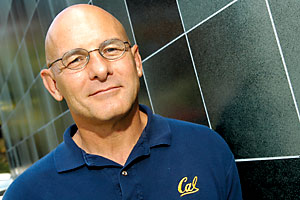Related Research Articles

Leslie B. Lamport is an American computer scientist. Lamport is best known for his seminal work in distributed systems, and as the initial developer of the document preparation system LaTeX and the author of its first manual. Leslie Lamport was the winner of the 2013 Turing Award for imposing clear, well-defined coherence on the seemingly chaotic behavior of distributed computing systems, in which several autonomous computers communicate with each other by passing messages. He devised important algorithms and developed formal modeling and verification protocols that improve the quality of real distributed systems. These contributions have resulted in improved correctness, performance, and reliability of computer systems.
In systems engineering, dependability is a measure of a system's availability, reliability, and its maintainability, and maintenance support performance, and, in some cases, other characteristics such as durability, safety and security. In software engineering, dependability is the ability to provide services that can be trusted within a time-period. The service guarantees must hold even when the system is subject to attacks or natural failures.

David Andrew Patterson is an American computer pioneer and academic who has held the position of professor of computer science at the University of California, Berkeley since 1976. He announced retirement in 2016 after serving nearly forty years, becoming a distinguished software engineer at Google. He currently is vice chair of the board of directors of the RISC-V Foundation, and the Pardee Professor of Computer Science, Emeritus at UC Berkeley.
A Byzantine fault is a condition of a computer system, particularly distributed computing systems, where components may fail and there is imperfect information on whether a component has failed. The term takes its name from an allegory, the "Byzantine Generals Problem", developed to describe a situation in which, in order to avoid catastrophic failure of the system, the system's actors must agree on a concerted strategy, but some of these actors are unreliable.
Brian Randell is a British computer scientist, and Emeritus Professor at the School of Computing, Newcastle University, United Kingdom. He specialises in research into software fault tolerance and dependability, and is a noted authority on the early pre-1950 history of computing hardware.
The International Federation for Information Processing (IFIP) is a global organisation for researchers and professionals working in the field of computing to conduct research, develop standards and promote information sharing.

Ian F. Akyildiz is the Ken Byers Chair Professor with the School of Electrical and Computer Engineering (ECE) at Georgia Institute of Technology, the Director of the Broadband Wireless Networking (BWN) Laboratory and Chair of the Telecommunications Group at the School of ECE at Georgia Tech. According to Google Scholar, his H-index is 122 and the total number of citations to his papers is 116+K.
In fault-tolerant distributed computing, an atomic broadcast or total order broadcast is a broadcast where all correct processes in a system of multiple processes receive the same set of messages in the same order; that is, the same sequence of messages. The broadcast is termed "atomic" because it either eventually completes correctly at all participants, or all participants abort without side effects. Atomic broadcasts are an important distributed computing primitive.

The IEEE Communications Society (ComSoc) promotes the advancement of science, technology and applications in communications and related disciplines. It fosters presentation and exchange of information among its members and the technical community throughout the world. The Society maintains a high standard of professionalism and technical competency. The IEEE Communications Society is a professional society of the IEEE.
IEEE Computer Society is a professional society of the Institute of Electrical and Electronics Engineers (IEEE). Its purpose and scope is "to advance the theory, practice, and application of computer and information processing science and technology" and the "professional standing of its members." The CS is the largest of 39 technical societies organized under the IEEE Technical Activities Board.
Keith Marzullo is the inventor of Marzullo's algorithm, which is part of the basis of the Network Time Protocol and the Windows Time Service. On August 1, 2016 he became the Dean of the University of Maryland College of Information Studies after serving as the Director of the NITRD National Coordination Office. Prior to this he was a Professor in the Department of Computer Science and Engineering at University of California, San Diego. In 2011 he was inducted as a Fellow of the Association for Computing Machinery.
Chandra Kintala (1948–2009) was a computer science researcher in New Jersey, United States and Bangalore, India from 2006–2009.
The American Federation of Information Processing Societies (AFIPS) was an umbrella organization of professional societies established on May 10, 1961, and dissolved in 1990. Its mission was to advance knowledge in the field of information science, and to represent its member societies in international forums.
The William C. Carter Award is a technical award presented annually since 1997 to recognizing an individual who has made a significant contribution to the field of dependable and secure computing throughout his or her PhD dissertation. It is named after, and honors, the late William C. Carter, an important figure in the field. The award is sponsored by IEEE Technical Committee on Fault-Tolerant Computing (TC-FTC) and the IFIP Working Group on Dependable Computing and Fault Tolerance.
Robert S. Swarz is the former co-director of the Systems Engineering Practice Office of MITRE Corporation and currently Professor of Practice in the systems engineering program at Worcester Polytechnic Institute, where he has been teaching for over 30 years and held the post of Chair of the Systems Engineering Advisory Council. He is a co-author of a classic text in computer reliability and fault-tolerant systems.
Patrick Denis Lincoln is an American computer scientist leading the Computer Science Laboratory (CSL) at SRI International. Educated at MIT and then Stanford, he joined SRI in 1989 and became director of the CSL around 1998. He previously held positions with ETA Systems, Los Alamos National Laboratory, and MCC.
Mootaz Elnozahy is a computer scientist. He is currently a professor of computer science and dean of the computer, electrical and mathematical science, and engineering division at King Abdullah University of Science and Technology. Elnozahy's research area is in systems, including high-performance computing, power-aware computing, fault tolerance, operating systems, system architecture, and distributed systems. His work on rollback-recovery is now a standard component of graduate courses in fault-tolerant computing, and he has made seminal contributions in checkpoint/restart, and in general on the complex hardware-software interactions in resilience.
Kishor Shridharbhai Trivedi is an Indian-American computer scientist who is currently the Hudson Chaired Professor in department of electrical and computer engineering at Duke University.
Saurabh Bagchi is an Indian-born American academic researcher and educator in the area of computer science and engineering. He is a professor of Electrical and Computer Engineering and Computer Science at Purdue University. His contributions have been in the area of reliability and security of distributed computing systems and Internet-of-Things (IoT). He leads a university-wide center CRISP at Purdue and Army Research Lab's Assured Autonomy Innovation Institute (A2I2) site at Purdue. He chairs the IEEE Computer Society Global Student Challenge Competition. He teaches a popular course available on edX called "Big data for reliability and security".
References
- ↑ Dependable Systems and Networks. DBLP.
- ↑ "DSN 2020 – UPV – València (Spain)" . Retrieved 2021-07-06.
- ↑ "DSN 2021 : 51st IEEE/IFIP International Conference on Dependable Systems and Networks - Sciencesconf.org". dsn2021.ntu.edu.tw. Retrieved 2021-07-06.
- ↑ "DSN 2022". dsn2022.github.io. Retrieved 2021-07-06.
- ↑ "Dependable Systems and Networks". www.dependability.org. Retrieved 2021-07-06.